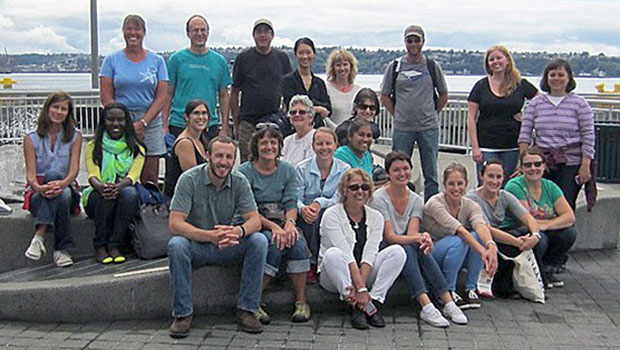Local heroes: CCHE helps communities show measurable change

Frequent flyer miles are racking up at the Center for Community Health and Evaluation (CCHE). Last year, researchers from CCHE, a unit within Group Health Research Institute (GHRI) since 2007, traveled to more than 75 U.S. communities. Paradoxically, the reason for all the road trips is a growing emphasis on locally focused health programs.
For example, Kaiser Permanente has projects in more than 40 communities to promote healthy eating and active living. CCHE is measuring those projects’ effects on community health. Closer to home, CCHE evaluated Seattle-area health needs to guide Group Health community initiatives. With clients in 12 states, CCHE is meeting the challenge of skyrocketing demand for community health evaluation, which is driven by several factors.
“It’s increasingly important for community health initiatives to show funders they are having a concrete impact on health,” said Allen Cheadle, PhD, who has directed CCHE since founding director Bill Beery, MPH, retired in 2012. Rising interest in CCHE services also comes from the national trend toward “place-based” programs that address local health issues. Examples are neighborhood-level initiatives to increase walkability and regional efforts to boost physical education in schools. These initiatives begin with an assessment of community health needs conducted by an evaluation agency such as CCHE. The drive for community needs assessments is creating opportunities for CCHE nationally and locally.
Instead of CCHE seeking clients, said Emily Bourcier, MPH, MHA, operations and development manager, “people are coming to us, which is nice. It shows we're doing something meaningful.” Being approached by various potential clients has diversified CCHE funding. In 2013, CCHE had $3.8 million of support from private foundations such as the Robert Wood Johnson Foundation, nonprofit agencies like the Patient-Centered Outcomes Research Institute (PCORI), and care-delivery systems such as Group Health and Kaiser Permanente. New funding also means new collaborations for CCHE investigators.
“In our developmental approach to evaluation,” said Dr. Cheadle, “we’re not just outside evaluators of a community health program, we’re also partners.” CCHE team members act as consultants to help a community health initiative evolve and improve. They measure where a project has an impact and work with initiative leaders to increase that impact. “Developmental evaluation is learning and improving as you go,” he added. “CCHE has always done that, but now the whole evaluation field is moving in that direction."
Under Dr. Cheadle's directorship, CCHE has increased its connections nationally as well as to GHRI and Group Health. Recent CCHE collaborations include:
- Group Health-GHRI projects to improve care for back pain funded by PCORI and the National Institutes of Health;
- LINCC, a PCORI-supported project to connect primary care patients with health-promoting community resources;
- Pilot projects from the Group Health Foundation Partnership for Innovation to improve advanced care planning and to reduce medical procedures that don't help patients and might risk harming them;
- LEAP, a partnership with the MacColl Center for Health Care Innovation and the Robert Wood Johnson Foundation to study exceptional primary care practices to find out what they are doing right—work that required week-long visits to 30 sites by CCHE team members;
- A program funded by the Bill & Melinda Gates Foundation and the Group Health Foundation to address vaccine hesitancy;
- Consultation to the Healthcare Georgia Foundation and Foundation for a Healthy Kentucky on evaluating projects by regional nonprofit health agencies.
All these projects involve intensive client contact, because personal connections to collaborators are a CCHE priority, said Dr. Cheadle. This means putting “boots on the ground” with in-person visits to see community health programs in action and consult with program leaders. This strategy made for a busy 2013 for CCHE team members, who are keeping their travel bags packed because the coming years look just as active.
by Chris Tachibana



